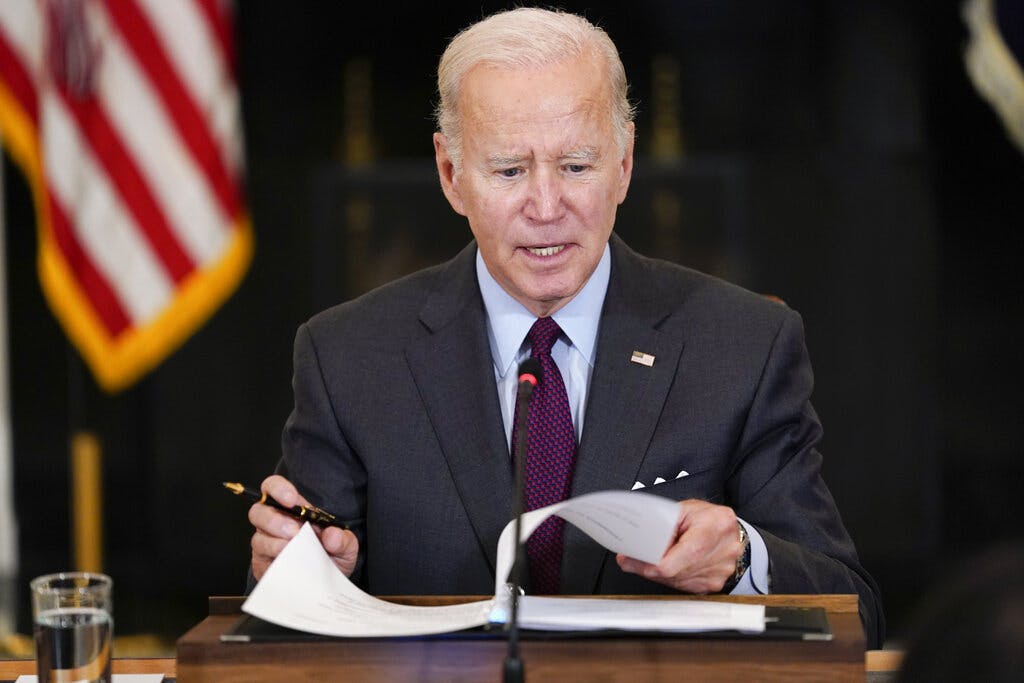Biden Backsliding With Middle East Policies
As during the Obama administration, the ‘share’ policy — strengthening Iran at the expense of the Saudis and Israelis — is again in vogue at Washington.

It is becoming increasingly apparent that President Biden is stumbling when it comes to the Middle East, reverting to policies set by President Obama that bolstered Iran at the expense of traditional American allies. The three most recent examples of this are easy to point to.
First, following OPEC’s decision last week to cut oil production, Mr. Biden is now calling for a reassessment of relations with the oil cartel’s leader, Saudi Arabia. Second, Secretary Blinken’s team today completed negotiations that potentially will steer vast new funding to a Tehran proxy, the terrorist group Hezbollah, which threatens war against Israel. Third, a UN nuclear watchdog is warning that the Islamic Republic is “rapidly expanding” its uranium enrichment program, defying America’s attempt to stop it diplomatically.
Does this all sound familiar? Here’s what President Obama told the Atlantic’s Jeffrey Goldberg in 2016: “The competition between the Saudis and the Iranians — which has helped to feed proxy wars and chaos in Syria and Iraq and Yemen — requires us to say to our friends as well as to the Iranians that they need to find an effective way to share the neighborhood.”
That “share” policy — strengthening Iran at the expense of the Saudis and Israelis — remains in vogue at Washington.
Mr. Biden is clear that “we need to continue to reevaluate” America’s relations with Saudi Arabia, the White House national security spokesman, John Kirby, told CNN today. The Senate foreign relations committee chairman, Robert Menendez, went even further, calling to “immediately freeze all aspects of our cooperation with Saudi Arabia, including any arms sales.”
“Reevaluating” the century-old American ties with Riyadh was high on Mr. Biden’s agenda as he ran for president in 2020. He later elevated the gruesome murder of Jamal Khashoggi beyond any other Mideast atrocity, calling the Saudi kingdom a “pariah” state and halting arms sales to Riyadh.
Reality dawned once energy costs started rising last spring. As part of the process of reevaluating his reevaluation, Mr. Biden traveled to the Kingdom in the summer, famously fist-bumping with Crown Prince Mohamad bin Salman — much to the chagrin of many in Washington. Yet the prince, who is the de-facto Saudi ruler, did not forget the first reevaluation.
On the eve of last week’s OPEC meetings, Washington officials frantically called their Riyadh counterparts, urging them to delay “for another month” the decision to cut production, the Wall Street Journal reports today. The Saudis, who saw these entreaties as a political maneuver related to the midterm elections, did not relent.
Once again, then, Washington is irate with Riyadh. Yet, what would Mr. Menendez’s “freeze” look like? “You’ll see Saudi Arabia turn more and more to Russia and China,” a Democratic senator, Adam Smith of Washington, told CNN today. “It’s a lot more complicated than just saying, you know, we don’t like Saudi Arabia therefore we’re cutting it off.”
True, the Saudis cooperate with the Russians in assuring that their respective oil profits remain high. Those ties, however, are dwarfed by the ever-tightening Moscow-Tehran alliance: According to President Zelensky, Russia just today placed a fresh order for 2,400 Iranian killer drones for use in the Ukrainian battlefield.
Tehran can legally sell drones to Russia because, as part of the “sunset” clauses in Mr. Obama’s nuclear deal, the United Nations Security Council in 2020 ended its previous ban on Iranian arms sales. More sunsets are due, until all nuclear restrictions expire at the end of the decade.
That, of course, is the deal that Mr. Biden is eager to revive. Sensing his eagerness, Iranian negotiators have led American counterparts by the nose all year — always to end up, like Lucy, pulling the footballs away from Charlie Brown.
The result: In its latest report, the International Atomic Energy Agency assesses that the Islamic Republic is rapidly expanding its ability to enrich uranium with advanced centrifuges at Natanz, and now intends to go further than previously planned, according to Reuters.
On another front, Israel and Lebanon today announced the completion of an American-brokered deal to demarcate their maritime border, temporarily removing Hezbollah’s threat to attack an Israeli gas-extracting Mediterranean rig and allowing a French company to start exploring gas reserves near Lebanon’s shores.
While the details of the deal, negotiated by Mr. Biden’s envoy, Amos Hochstein, are unknown to the Israeli public, Washington is urging Jerusalem to quickly ratify what Mr. Biden termed today a “historic breakthrough in the Middle East.”
Washington and Jerusalem are brushing off political opponents, accusing them of strengthening the real Lebanese sovereign, Hezbollah: The deal “would weaken Lebanese dependency on Iran, restrain Hezbollah, and bring regional stability,” Prime Minister Lapid said today.
Yet, no deal could have been reached without a nod from the Hezbollah chief, Hasan Nasrallah. Also, none would have been achieved if the terror organziation’s Tehran masters had vetoed it. Indeed, as Reuters’s deputy bureau chief at Beirut, Timour Azhari, tweeted, Hezbollah “green-lit” the deal.
Mr. Biden’s July fist bump at Riyadh and his verbal rebuke of the Iranian mullahs over their repression of widespread anti-regime protests provided a short respite. He now once again seems fully committed to a return to Mr. Obama’s Mideast rebalancing act.

